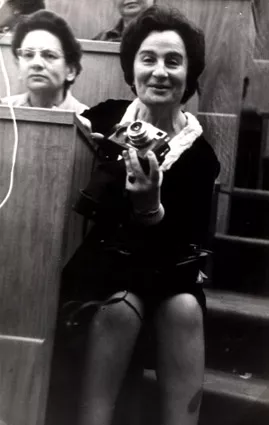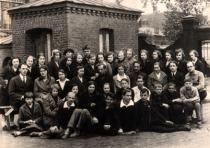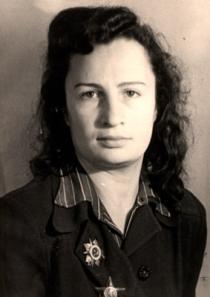This is the year of 1965. The picture was made in one of the auditoriums of Moscow Medical Institute. The alumni got together in 20 years after graduations. I dressed in velvet dress with white collar. Mother remade that dress from her skirt, when I was a fresher. Everybody said that I did not change. Next to me is a lady, whom I do not know.
I was demobilized in June 1946. War left a trace. I could not listen to music for a long time. When I heard the march, I burst into tears. I still cannot listen to military marches, watch movies about war because too deep the imprint is. When I came back home, I was a different person, not the student girl. I came back to my parents to the same apartment, where my mother and sister Maria lived. Then brother Evsey came back from the front lines. There was no room for all of us. I had lived with my parents until 1961.
When I came back to Moscow, I tried to become a post-graduate student. I had to go through residency training first. Anti-Semitism was not only observed in every day life, but at the state level as well. It was hard for me, a Jew, to enter. I decided not regain pediatrics studies (it was my specialty at the institute). I had to amputate too often… I was afraid that my heart hardened and I would not be able to treat children. I applied for surgery chair, but I was not admitted there because of my nationality. None of the Jews was admitted. It was the first time when I came across state anti-Semitism, which was not felt before the war.
I managed to go to the chair of radio and nuclear medicine, but I could not finish it as I was afflicted with leucopenia because of working with x-ray machines. Doctors prohibited me to work in the field of radio and nuclear medicine, but knowledge, acquired in residency training were used further on in my work. I took different refreshment courses and became multi-field doctor. After unsuccessful attempt to finish residency training, I had to look for a job. It was the year of 1948 there was a rotten air of anti-Semitism. Fortunately the deputy head of the chief therapeutic physician was Ivanov, my former boss during the war. Of course, he hired me. I had worked there for 23 years as a common surgeon with intermission during oncology courses. Having finished oncology courses, I became oncologist-surgeon.
Once in February 1950, engineer Yuri Shabad came to our hospital to see a doctor. It was a fateful visit. Yuri was born in Minsk in 1913. He came of intelligentsia. On the 5th of August 1950 we got married. We registered our marriage in a regional marriage registration office. In the evening we had a party with our relatives and friends. We could not even think of a traditional Jewish wedding back at that time. Both of us were communists, so it was impossible for us.
Both Yuri and I had neither money nor a lodging. We lived with our parents in a room of 10 sq. m. His salary was skimpy and my salary was not that big, but he had never heard a reproach from me regarding the lack of money. We had lived that way for 32 years. We got along with his daughter from the first marriage. Our daughter Sofia named after my deceased mother was born in 1951.
We had a lot of friends. I had school and university friends. There were friends among my colleagues as well. Of course, my husband and daughter had their own friends. Guests were welcome in our house. Some of them found no pretext to come over. They just came to chat. On the occasion of birthday or celebration of soviet holidays we had to invite friends in several rounds as our apartment was too poky. We always celebrated 1st of May, 7th of November, New Year's Day, Soviet Army Day and Victory Day. We liked to spend vacations in the hamlet out of Moscow. We rented a room from the locals not far from the pond.
















